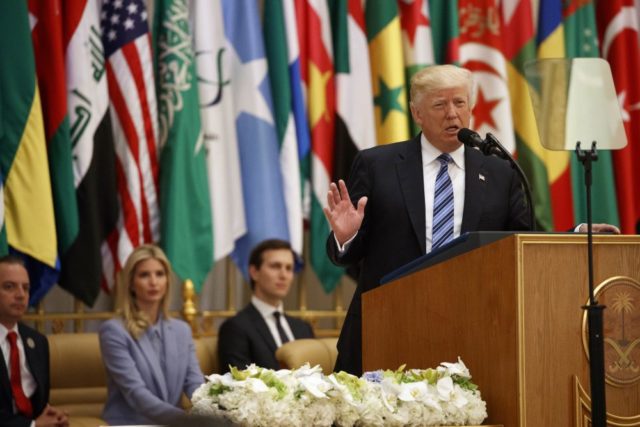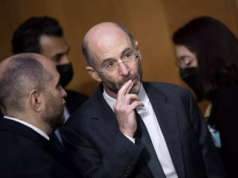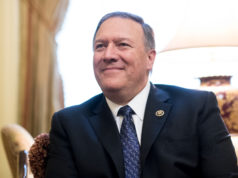Wtih global conflicts stretching the United States toward the breaking point, many feared that the world’s only superpower in 2017 was headed over a cliff.
Flailing policies in Afghanistan stole hard-fought American military gains and had made the Taliban enemy a player again. Things became even worse in Iraq, with ISIS jihadists forming their own caliphate in the north and into Syria, and the Islamic Republic of Iran conquering much of the rest of Iraq, including co-opting the U.S.-installed government in Baghdad. Iran not only built ballistic missiles and probably an atomic bomb, but received pallets of cash from Washington in the process – and now, as we are learning, a free pass for Hezbollah as part of the deal. North Korea proved its capacity with successful ballistic missile launches and underground nuclear tests.
Communist China built militarized reefs in international waters, hacked into the U.S. Office of Personnel Management records and stole the most personal details of every American who had applied for a security clearance, and embarked on an aggressive strategic nuclear weapons upgrade. Vladimir Putin’s Russia unveiled a new generation of strategic nuclear warheads and delivery systems without a peep of protest from Washington, indirectly had paid the husband and family foundation of a sitting secretary of state, shot down a Malaysian jetliner during its invasion and annexation of parts of Ukraine, and openly threatened NATO allies with subversion and destruction.
Chinese espionage and influence operations are so vast that nobody in the U.S. can seem to keep track. Russia’s aggressive intelligence collection and operations against the United States exceeded Cold War levels. Trans-national crime cartels, narcotics smuggling, human trafficking, child warriors, weapons proliferation, and other nightmares suddenly made Honduras and Peru, Uganda and Chad, Pacific Island microstates and other backwaters compelling national interests as illegal immigrants by the millions flooded the United States with impunity.
The Pentagon’s 388-page Dictionary of Military and Associated Terms didn’t even have a definition for “victory.”
Without defining victory, the United States operated almost 800 military facilities in 70 countries and territories in 2015. They ranged from giant bases like Okinawa to small “lily pads” in Burkina Faso, according to a study by American University Professor David Vine. The annual cost is estimated at between $245 and $300 billion. One of those bases, Al Udeid, Qatar, is a vital hub for the U.S. Central Command (CENTCOM), which leads most of the fight against the very terrorists that the Qatar regime is indoctrinating and funding.
Russian, Chinese, and other unfriendly interests infiltrated the leadership and bureaucracies of the great multilateral organizations created and mostly funded by the United States and its closest allies, including the World Bank and International Monetary Fund, both based just blocks from the White House.
This was the background to outsider Donald Trump’s transition to the presidency. Trump arrived at the White House doubly handicapped: He had trouble building a cohesive national security team and remained dogged by allegations that he or members of his inner circle had “colluded” with the Kremlin to win the 2016 election, along with some KGB hacking of electronic voting records.
The allegations seemed serious, considering the source: leaks and later public statements from senior officials in the FBI, CIA, and Director of National Intelligence. The Trump team did a poor job addressing those allegations. It offered no guiding philosophy or strategy other than to “make America great again.”
In inheriting the mess left by his predecessor, president Trump offered little concrete assurance that he would really fix things.
To this day, dozens of senior presidential posts remain unfilled in the State Department, Justice Department, and Pentagon. Trump’s first team under National Security Adviser Michael Flynn blew apart before it could assemble, with a decidedly establishmentarian figure, active duty Lt. Gen. H. R. McMaster, firing most of the Trump loyalists and building a team of Obama holdovers. The strong personality of Defense Secretary James Mattis, a retired Marine four-star general, provided a steady hand that favored Clinton-Obama defense experts anathema to Trump. Secretary of State Rex Tillerson appointed few to carry out his bureaucratic reform objectives, relying heavily on the professional (and very ideological) foreign service and a dumpsterful of Obama loyalists.
For those in the national security and diplomatic fields – even many of his sympathizers and supporters – Trump seemed an unlikely person to come up with a coherent and workable strategy for American world leadership.
Then, days before Congress passed his promised tax reform, Trump released his first annual National Security Strategy. Brash Trumpian rhetoric that espoused vague notions of American greatness coalesced December 18, 2017 into a thoughtful, purposeful roadmap. An “America First” strategy suddenly didn’t seem so extreme, even though it was unabashedly Trumpian.
Business Experience and Personal Leadership
Trump either didn’t bother, or more likely was not prepared, to reorganize his government and appoint MAGA people to senior posts before he grew his presidential worldview. He used the theatrical power of his strong personality as a blunt instrument, yet did so with surgical precision. It was almost as if he didn’t need his (overwhelmingly unsupportive) diplomats to nuance his statements with the wishy-washy “what the president meant to say was”-type comments.
The president had hybridized the bully pulpit. He merged fellow populist Theodore Roosevelt’s style, when “bully” meant “beautiful” or “wonderful” – two of Trump’s favorite adjectives – with the modern sense of using intimidation or psychological force.
The foreign policy establishment hated it. But key players around the world loved his personal power and rhetoric, and strong sense of purpose. Instead of rallying his own diplomats, message-shapers, and others, Trump empowered foreign leaders who shared his interests to do the work on their own.
He showed the same trait in empowering U.S. military commanders waging the war against ISIS. The president delegated authority to the commanders themselves, with a simple order: Destroy the enemy.
This sense of empowering underlings, plus allies, coalition partners, and other sovereign powers that shared specific interests with America, became a core of Trump’s national security strategy. It was as if he had borrowed from his come-from-behind presidential campaign in a crowded field and used his simple and personal forcefulness to throw his opponents off-track and empower those with shared interest. He let his own personality generate tens of millions of dollars of free media to keep his costs down and let others carry his message.
It was as if he already had the key to regaining America’s dominance around the world for pennies on the dollar.
Trump’s strategic worldview coalesced in two major speeches: his “drive them out” address in Riyadh last May; and his “defense of Western civilization” speech last July in Warsaw. In each speech, Trump singularly exercised brash but carefully calibrated leadership. He alienated friends, nominal friends, and allies on purpose in order to force them to deal on his terms, while empowering the people and countries he wanted to empower.
Standing in the Saudi capital before assembled world Muslim leaders, Trump ripped into individuals, governments, and regimes that directly or indirectly supported Islamist political indoctrination, subversion, and violence. He told Muslim leaders again and again to identify the Islamists and “drive them out.” That speech, and substantial behind-the-scenes politicking, sparked a remarkable transformation.
Suddenly, some of the worst challenges the U.S. faced in attacking jihadist ideology started to recede. The Wahhabi regime of Saudi Arabia took the lead in driving jihadist ideologues out of mosques, schools, political and administrative positions, and more. Allied with other Gulf states, the Saudis began a common purge, quickly isolating and squeezing the only Arab holdout – the rival Wahhabi regime of Qatar – which continued to support the Muslim Brotherhood, Islamists and jihadist terrorists of various stripes, and the Islamist Erdogan regime in Turkey and the Shi’ite Islamic Republic of Iran.
Ultimately, the Saudi response to Trump’s December announcement that the U.S. would move its embassy in Israel to Jerusalem was muted. Ditto for Egypt, Kuwait, and the UAE. The embassy move to Jerusalem, taboo for decades, for fear of alienating important Arab countries, wasn’t such a big deal after all. This effort was, no doubt, worked behind the scenes by adept diplomacy among the U.S., Israel, and Arab countries, but the expenditures were minimal and with great effect.
Trump’s Warsaw speech supported the efforts of Poland and a few other Central European countries to save their civilizations from foreign refugee invasions that would retard their demographics and ruin their national identities. No longer were Poland, Hungary, and the Czech Republic isolated under German Chancellor Angela Merkel’s satisfied thumb. Trump supported their courage more strongly than he endorsed Britain’s exit from the European Union. And he didn’t shrink from his critics. Indeed, he seemed to derive more energy from their opposition.
This was leadership. Many found it shocking, and branded the president a reckless rogue. Donald Trump, a new president who had never governed beyond his family business, virtually isolated from Congress and the federal bureaucracy and with an administration in disarray, was guiding the United States through countless crises and challenges that had seemed to be without end.
Empowerment and Leverage
Trump spelled out much of his approach in his national security strategy. He had a simple formula. He made a vision statement, based on American founding principles and placing the well-being of all American citizens first. He explained his approach or business model. He prioritized. He delegated. He expected others to share responsibility. He challenged and empowered others. He offered respect to all, rallying competition but demanding fair play. He would tolerate no nonsense. He set out a new kind of American leadership in the world. He wasn’t going to try to save every failed state. Countries that can’t or won’t lift themselves up with some help, he explained, would be left to fail. Or the private sector could do the work without burdening the American taxpayer.
Decentralization is one of the keys. Washington cannot – and will not – try to manage everything any more. Successive interventionist administrations, Democrat and Republican, had tried to lead the world through management, Trump reasoned. They became so complacent leading the world’s only superpower that they stopped seeing the subversive and military threats around them until too late. Then they would jump into a conflict or war for lack of foresight and integration of all elements of statecraft. Again and again and again. With no plan for victory.
Citing the American founders, Trump noted in his strategy that every human being has a God-given right to be a sovereign individual. Every person has a role to play if they wish. Governments answer to the people, not vice-versa. Nations, too, are sovereign. In Trump’s words, “peace, security, and prosperity depend on strong, sovereign nations that respect their citizens at home and cooperate to advance peace abroad.” There’s a mutuality, a reciprocity here, just as in business, but also a sense of fair play. Governments had to earn their place by how they respected their citizens and cooperated with the rest of the world.
This is not globalism. And it certainly is not isolationism.
Allies, in Trump’s view, don’t need to be a burden. They should be assets. “Allies and partners magnify our power,” the National Security Strategy says. “We expect them to shoulder a fair share of the burden of responsibility to protect against common threats.” Alliances and partnerships will be voluntary and mutually reinforcing: “We are not going to impose our values on others. Our alliances, partnerships, and coalitions are built on free will and shared interests. When the United States partners with other states, we develop policies that enable us to achieve our goals while our partners achieve theirs.”
This is businesslike statecraft. This is an economizing approach. It requires fewer diplomats, bureaucrats, lawyers, troops, and tax dollars. It allows the United States to look after its interests by empowering and expecting others to do the same, and working with those who share our own interests.
Defeat and Destroy
To President Trump, winning is mandatory. It is not a matter of military power. It is a matter of mindset. His strategy repeatedly states that the United States and its allies and partners should “defeat” all enemies and “destroy” jihadist terrorists and ideologues. America’s diplomats must become less complacent and more outgoing: “We must upgrade our diplomatic capabilities to compete in the current environment and to embrace a competitive mindset.” As part of what he called “information statecraft,” Trump said “We will improve our understanding of how adversaries gain informational and psychological advantages across all policies. The United States must empower a true public diplomacy capability to compete effectively in this arena.”
“We need our allies to do the same,” Trump said, about modernizing and improving, “and affirm the political will to win.”
Asymmetric vision
As laid out in the National Security Strategy, Trump understands asymmetric warfare better than previous American presidents. According to his strategic vision, the nation’s adversaries are strong because they study our institutions, processes, philosophy, and actions, to look for our weak points. Here is some of what he said:
• “Adversaries target sources of American strength, including our democratic system and our economy.”
• “Adversaries studied the American way of war and began investing in capabilities that targeted our strengths and sought to exploit perceived weaknesses.”
• “Russia aims to weaken U.S. influence in the world and divide us from our allies and partners.”
• “Through modernized forms of subversive tactics, Russia interferes in the domestic political affairs of countries around the world.”
• These approaches “enable adversaries to attempt strategic attacks against the United States – without resorting to nuclear weapons – in ways that could cripple our economy and our ability to deploy our military forces.”
• America’s “adversaries and competitors become adept at operating below the threshold of open military conflict and at the edges of international law. Repressive, closed states and organizations, although brittle in many ways, are often more agile and faster at integrating economic, military, and especially informational means to achieve their goals.”
• “Repressive leaders often collaborate to subvert free societies and corrupt multilateral organizations.”
• “They employ sophisticated political, economic, and military campaigns that combine discrete actions.”
• “They are patient and content to accrue strategic gains over time – making it harder for the United States and our allies to respond.”
• “Such actions are calculated to achieve maximum effect without provoking a direct military response from the United States. And as these incremental gains are realized, over time, a new status quo emerges.”
• “The United States must prepare for this type of competition. China, Russia, and other state and non-state actors recognize that the United States often views the world in binary terms, with states being either ‘at peace’ or ‘at war,’ when it is actually an arena of continuous competition. Our adversaries will not fight us on these terms. We will raise our competitive game to meet that challenge, to protect American interests, and to advance our values.”
He didn’t say it plainly in his strategy, but Trump shows that he views world politics as constant political and psychological warfare. That type of conflict is cost-effective and can keep competition below the military tripwire. However, the best political and psychological warfare is backed with the threat of overwhelming destruction. In the words of the National Security Strategy, “We must convince adversaries that we can and will defeat them – not just punish them if they attack the United States.”
This is a real integrated approach to American national interests. American leaders should do what is best for the nation and the people. Not for other nations and people. That criterion alone slashes the U.S. global presence, while maximizing the economic benefit for American workers, businessmen, and investors. America finds allies and partners valuable, but only those with shared goals, a shared material burden, and the will to win. That cuts the burden even further.
Weak and emerging friends and partners who accept American help must earn their own place in the value chain so they can be sovereign and self-sufficient, or at least mutually beneficial to the United States, thus slashing the American burden even more. Those who will not implement sensible policies to prosper must fall by the wayside and accept charity from others. Re-vamping intelligence collection and analytical capabilities for long-term strategic purposes to anticipate events, cuts expenses by reducing the need for costly reactive policies. The same is true for those who would harm us.
Just when it seemed as if American global power was falling off the precipice, a brash and novice president found a way to prioritize national interests and economize the instruments of statecraft. Much of Donald Trump’s strategy recognizes and accepts the status quo. What’s revolutionary is his vision to regain American supremacy, build alliances, and defeat adversaries without bankrupting the country. If he starts appointing people fit for the job who share his views, he can make America great again.
J. Michael Waller, Ph.D., is Vice President for Government Affairs at the Center for Security Policy, and a founding editorial board member of Defence Strategic Communications, the scholarly journal of NATO’s Strategic Communications Centre of Excellence.






